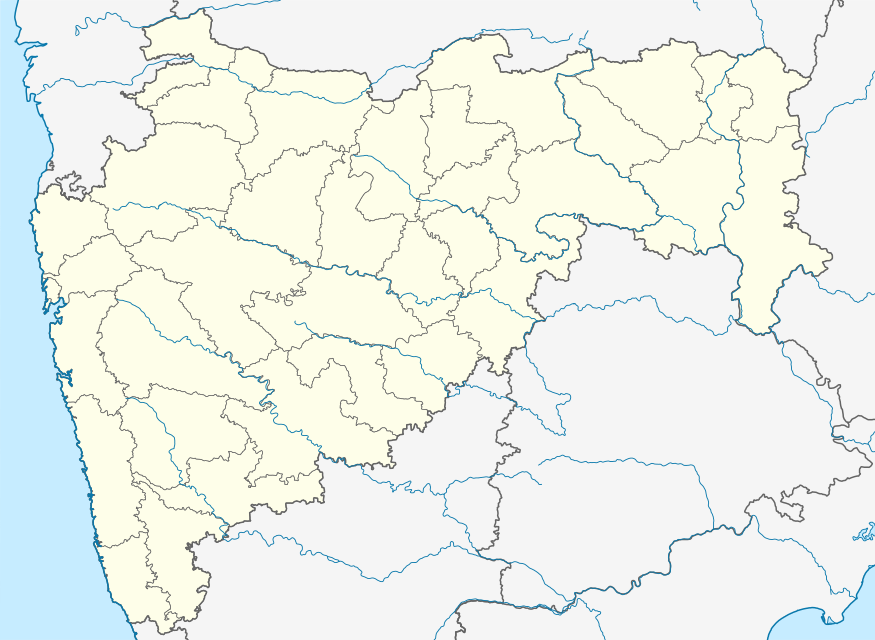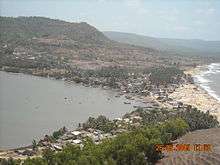Korlai Portuguese creole
Korlai Indo-Portuguese is a creole language based on Portuguese, spoken by less than 1,000 Luso-Indian Christians in an isolated area around the village of Korlai in Raigad District of Maharashtra state, India. It is located between Goa and Daman. It has vigorous use and it is also known as Kristi ("Christian"), Korlai Creole Portuguese, Korlai Portuguese, or Nou Ling ("our language" in the language itself).
| Korlai Indo-Portuguese | |
|---|---|
| Kristi | |
| Nou Ling | |
| Native to | India |
Native speakers | 750 (1998)[1] |
Portuguese Creole
| |
| Language codes | |
| ISO 639-3 | vkp |
| Glottolog | korl1238[2] |
| Linguasphere | 51-AAC-agc |
 Korlai Indo-Portuguese  Korlai Indo-Portuguese | |
| Coordinates: 18.5232°N 72.9195°E | |
Distribution and number of speakers

The village of Korlai lies on the mouth of Kundalika River, across from the ruins of a large Portuguese fort, which is located in Revdanda. Until the 20th century, Korlai, its Christian inhabitants, and its language were relatively isolated from the Marathi-speaking Hindus and Muslims surrounding them. Since 1986, there is a bridge across the Kundalika River, because of which industry has now moved into the area.
What is known about the history and the grammar of No Ling can be found in the 1996 book The Genesis of a Language: Formation and Development of Korlai Portuguese written by J. Clancy Clements.
Examples of No Ling
- Thanks a lot: Muit'obrigad! From Port. Muito Obrigado
- I: yo; From Port. eu
- You (singular): wo; From Port. vós
- You (formal): usé; From Port. você
- He and She: el; From Port. ele (he) and ela (she)
- We: no; From Port. nós
- You (plural): udzó; From Port. vós outros
- They: eló; from Port. eles outros
- Numerals: ũ, doy, tre, kwat, sink, sey, set, oyt, nob, dey; From Port. um, dois, três, quatro, cinco, seis, sete, oito, nove, dez
- First, Second: Primer, Sigun; From Port. Primeiro, Segundo
- How are you?: Use, kile te?
- All are eating and drinking their fill: tud gent cumen beben tem fart; From Port. toda a gente come e bebe até farta
Song of Korlai:
- Maldita Maria Madulena,
- Maldita firmosa,
- Ai, contra ma ja foi a Madulena,
- Vastida de mata!
Portuguese translation:
- Maldita Maria Madalena,
- Maldita Formosa,
- Ai, contra minha vontade foi a Madalena,
- Vestida de mata!
English translation:
- Cursed Maria Madalena,
- Cursed Beautiful one,
- Oh, against my will it was Madalena,
- Dressed in leaves and branches!
References
- Korlai Indo-Portuguese at Ethnologue (18th ed., 2015)
- Hammarström, Harald; Forkel, Robert; Haspelmath, Martin, eds. (2017). "Korlai Portuguese". Glottolog 3.0. Jena, Germany: Max Planck Institute for the Science of Human History.
Further reading
- Clements, J. Clancy (1996). The Genesis of a Language: the formation and development of Korlai Portuguese. Amsterdam: John Benjamins. ISBN 9789027252388.
- Clements, J. Clancy (2015). "Portuguese Settlement of the Chaul/Korlai area and the Formation of Korlai Creole Portuguese". Journal of Language Contact. 8 (1): 13–35. doi:10.1163/19552629-00801002.